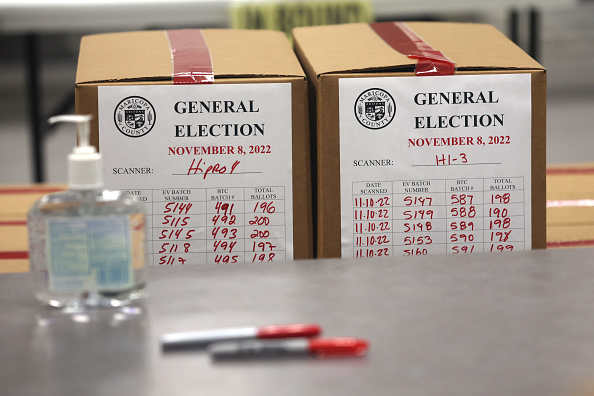County officials in Arizona’s largest district are once again trying to get out ahead of far-right conspiracy theories, with officials publishing a new report over the weekend reiterating that problems that occurred with their printers on Election Day didn’t violate the Arizona Constitution or prevent residents from voting.
Maricopa County has become a national draw for Republicans’ Big Lie ire after dozens of voting centers in the district experienced printer issues on Election Day, making it difficult for ballots to be tabulated. As a result, officials gave voters the option of submitting their ballots in a drop box to be counted later or voting at another precinct. The issue was resolved within hours, but Republicans have since seized on the glitch to argue that the election wasn’t conducted fairly—and in some cases, that it led to flawed election results.
Last week, for example, Republican attorney general candidate Abe Hamadeh filed a lawsuit citing the printer issues as reason why a state court should name him rightful winner of the election, even though he lost to Democratic opponent Kris Mayes by 510 votes, a slim enough majority to trigger an automatic recount. Republican gubernatorial candidate and Trump favorite Kari Lake also cited the issues as rationale for why she still refuses to concede to Democratic governor-elect Katie Hobbs.
Liz Harris, a Republican state representative who actually won her race, has even refused to vote on any bills in the Arizona state house until the election is redone, again, citing the printer issues that she’s characterized as “foul play”.
So, the Arizona attorney general’s office Election Integrity Unit sent Maricopa County a letter on Nov. 19 requesting more information about the disruptions and accusing officials of violating Arizona’s Constitution. Assistant Attorney General Jennifer Wright, who moonlights as a conservative activist, made it clear how she felt about the technical difficulties ten days before penning the letter.
Thomas Liddy, division chief of Maricopa County’s Civil Services Division and a devout Republican, responded on Sunday with a five-page report explaining the legal ramifications of the issues.
The assistant AG claimed in the letter that the printer issues violated Article II, Section 21 of the Arizona Constitution requiring “uniform and free election,” as well as other statutes requiring “uniformity in the procedures for voting and tabulation of ballots.” Liddy refuted each of these claims in his Sunday report.
“This constitutional guarantee means that the state of Arizona must provide for uniformity in elections across the state so that they will be free and equal for all the state’s voters,” Liddy wrote. “It does not mean that an election might be invalid if there are unexpected printing difficulties preventing on-site tabulation, when all the voters who attempted to vote were provided legal options for doing so.”
The statutes don’t require that “every printer and tabulator work perfectly such that there can never be any unplanned and unanticipated equipment malfunctions or failures,” Liddy wrote. And moreover, he argues, “all voters were still provided reasonable, lawful options for voting.”
Read the full report below:







First! Native Arizonan loving this!!!
Hi! To find out what I can do, say
@discobot display help.Is Kari having sads?
This has to frost the election officials in Maricopa county who I am told are all Republicans. It would seem that according to Kari Lake they are all in league with those barely human Democrats.
WTF is wrong with these whiney little bastards? They were likely shunned as kids because they wouldn’t play fair, so now they’ll get even.